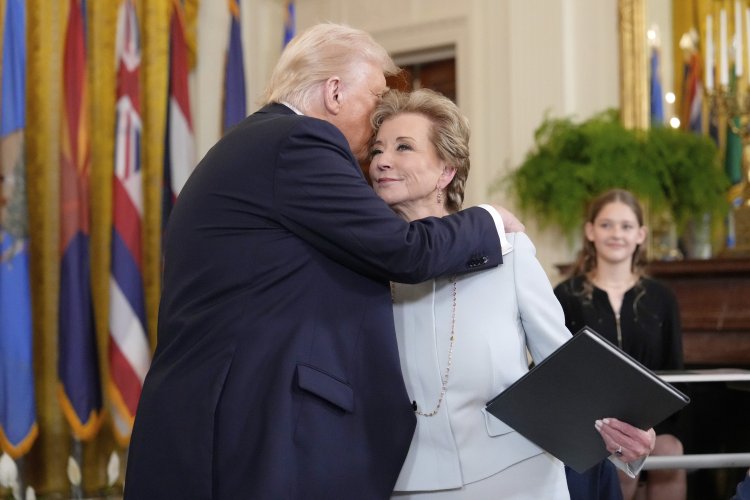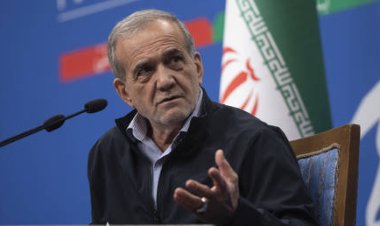Why Slashing the Department of Education Could Be a Major Misstep for Trump
Former Education Secretary Margaret Spellings, a Republican, expresses concerns regarding Trump’s plans.

However, not all conservatives share this sentiment, as pointed out by Margaret Spellings, who brings a sense of humor to the discussion.
As the Education Secretary under President George W. Bush from 2005 to 2009, Spellings played a significant role in a Republican administration that aimed for a stronger federal presence in education to achieve conservative policy objectives.
Currently the president of the non-profit Bipartisan Policy Center in Washington, Spellings, a longtime supporter of Bush, expresses concern that Trump’s emphasis on dismantling and reorganizing the bureaucracy—by transferring the student loan portfolio to the Small Business Administration, eliminating remaining Bush-era accountability programs, and reducing staff—might divert policymakers' attention from falling student performance in reading and math, which worsened during the Covid pandemic.
“We ought to just be on fire about it, but instead we’re going to see: Does the SBA know how to run a student loan portfolio?” Spellings elaborated during our conversation in her downtown office, which features memorabilia from the congressional passage of Bush’s hallmark “No Child Left Behind” legislation. “I’m not hearing a lot about that student performance issue.”
No Child Left Behind, which garnered support from both conservatives and liberals aiming to address achievement gaps for disadvantaged students, amplified student testing and penalized schools that failed to meet strict federal standards. Its unpopularity across the political spectrum led to a considerable devolution of authority to state and local levels in 2015, predating calls for greater parental control over schools in the aftermath of Covid.
For this reason, targeting the federal Education Department currently “is a red herring in a lot of ways,” Spellings stated.
This dialogue has been condensed for brevity and clarity.
Republicans have fluctuated in their calls to eliminate the Department of Education over the years.
During the Bush administration, such calls were notably absent—he was the only Republican president who did not advocate for the elimination of the Department of Education.
The Trump administration is actively attempting to carry it out. Is it surprising they have reached this point, and will it unfold as they envision?
Having worked with Bush for many years, Spellings recalled his campaign trail assertion that when people heard "abolish the Department of Education," they interpreted it as "abolish education." She emphasized that no one desires to eliminate education itself, as it is widely viewed as the pathway to the American dream.
The premise of No Child Left Behind—originating from innovative practices in Texas and North Carolina—was centered around the idea of "care enough to find out," emphasizing assessment and resource allocation for fundamental skills like reading and math. She believes this remains a valid federal policy principle: “If we’re going to spend money, we ought to get something for it.”
Spellings then retrieved a chart displaying the progress of fourth-grade math scores, which showed an upward trend over two decades, followed by a more recent decline.
"Bush plus Obama gave us results that looked like that, going in the right direction," she noted, "And then, of course, Covid. But the decline started really before Covid because we took our foot off the gas, had less muscular accountability, and more local control. There’s tons of local control. It’s a red herring in a lot of ways."
As for the potential dismantling of the Department of Education, Spellings acknowledged that Congress will ultimately decide. “Will people notice?” she wondered aloud. “I bet, especially when we’re in admission season. Can half the people do all the work in the high season? Remains to be seen. About to find out. So maybe so, maybe no.”
Reflecting on her experience in a more robust federal education role, she shared insight on how things have changed since then.
"It was much more muscular around getting value for our federal investments,” she stated. “No Child Left Behind said: Test every kid in two subjects—reading and math—every year and report that data to the public.” States like Texas expanded this to include social studies and science assessments, leading to concerns of excessive testing.
During the Obama years, initiatives like “Race to the Top” tailored accountability efforts to reward teachers for their performance, which unintentionally alienated some educators. “I guess it went a little bit ‘killed the goose that laid the golden egg,’” Spellings reflected.
Despite the significant progress made, especially in the advancement of educational policy, she lamented the loss of many of those gains.
The federal education role was firmly established during the Great Society era under LBJ, and later solidified into a standalone department by Jimmy Carter. The foundational belief was to create equal opportunities regardless of geography, and “that the federal government had a stake in that,” Spellings remarked.
When discussing the initial bipartisan support for No Child Left Behind, she pointed to the official vote tally from the Senate, which was overwhelmingly in favor at 87-10, highlighting the shared commitment across party lines.
“Can you envision anything like that today?” I asked.
“Possibly at the state level,” Spellings responded. She noted that state legislatures often work more collaboratively due to their proximity to administrative branches. However, she emphasized that strong leadership would be critical for any substantial progress.
“We’ve got to keep the main thing the main thing. This is the main thing: Student achievement, not what agency is going to do this or that. But that’s where we are right now, talking about the administrative niceties of the bureaucracy.”
Spellings mentioned her limited interaction with Education Secretary Linda McMahon. "I have met her," she shared, expressing that McMahon has clear directives from the president but must also consider Congressional input. She expressed optimism about the current administration’s lack of a stated intent to cut funding, indicating that there is ample work to be done in the education sector.
Spellings articulated potential risks both in policy and politics given the current trajectory of Trump’s administration.
"When we say we’re going to send it to the states, does that mean that the big block grant goes to Governor Abbott, to augment universal school choice programs or whatever he might prioritize, as opposed to whatever the prerogatives of the urban district are—in the name of local control?” She suggested that this could spark conflict; state versus urban locals can create significant tension.
Another concern she raised was maintaining focus on student achievement amid turmoil. “I think they—the Trump administration—also needs a ‘for’ agenda, not just a ‘We’re tearing it down’ agenda. We have to be about student achievement.”
Moreover, Spellings warned about the implications of reduced accountability and transparency. The potential elimination of the Institute of Education Sciences and other key resources developed during the Bush administration could hinder valuable insights about educational performance. “We just had the National Education report card,” she reminded. “We learned that Alabama, Mississippi and Louisiana are killing it in reading. What can we learn from that?”
As for the impact of the pandemic on education, Spellings noted emerging evidence suggesting that states that maintained in-person instruction outperformed those that closed schools. “It’s been dramatic declines and a lack of urgency now about doing something about it,” she lamented.
She echoed her earlier sentiment, stressing, “We ought to just be on fire about it, but instead we’re going to see: Does the SBA know how to run a student loan portfolio? Not that we can’t do both, but I’m not hearing a lot about that student performance issue.”
Regarding higher education, Spellings commented on the Trump administration’s laser focus on elite institutions. Drawing from her experience as a university system leader at the University of North Carolina, she understood the complexities faced by today's university presidents.
"Transgender bathrooms, Confederate monuments and academic cheating, that was my remit,” she shared, reflecting on the pressures of navigating differing political extremes.
When discussing whether universities are overcompromising with the Trump administration, she expressed concern for the future of research capacity. “If I were—and I’m not, happily—a university president today, I think destroying or really harming the research seed corn for our nation is existential sort of stuff.”
Spellings concluded by emphasizing the fundamental importance of investing in educational leaders, stating, "These people who do this kind of work are the leaders in your community, the brainiacs of your research triangle. They’re not the people you want to run out of Dodge.”
Jessica Kline for TROIB News












